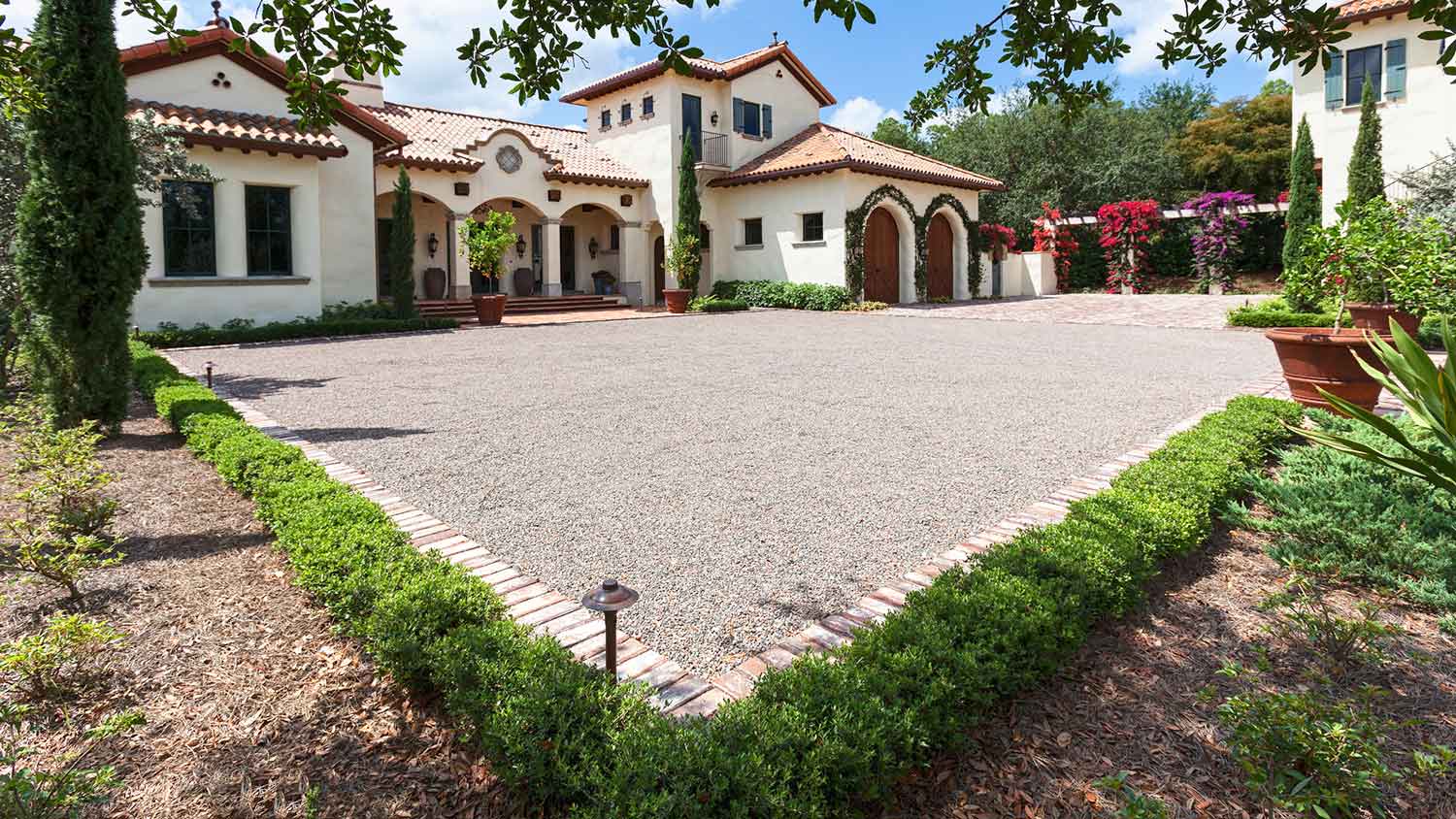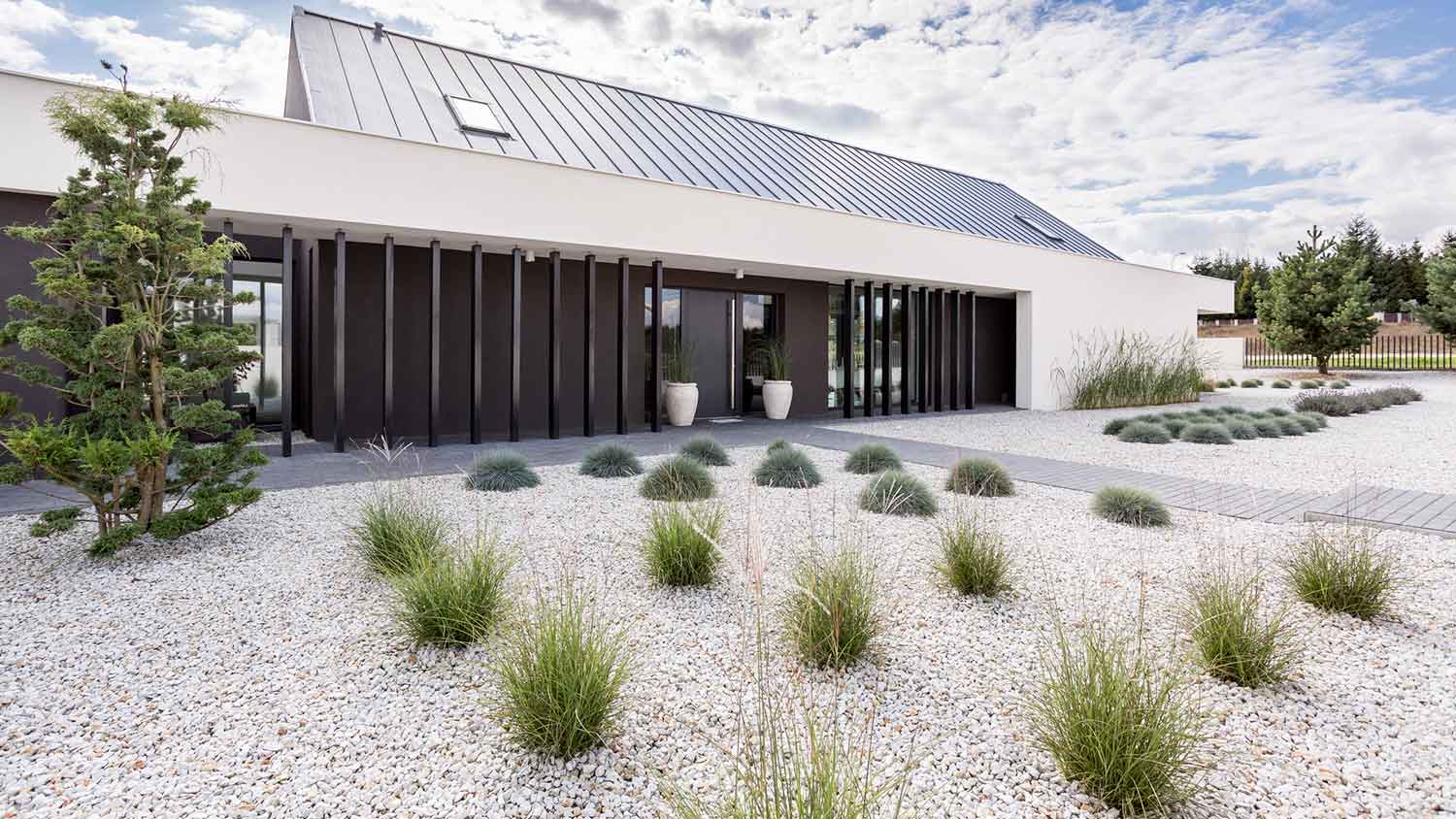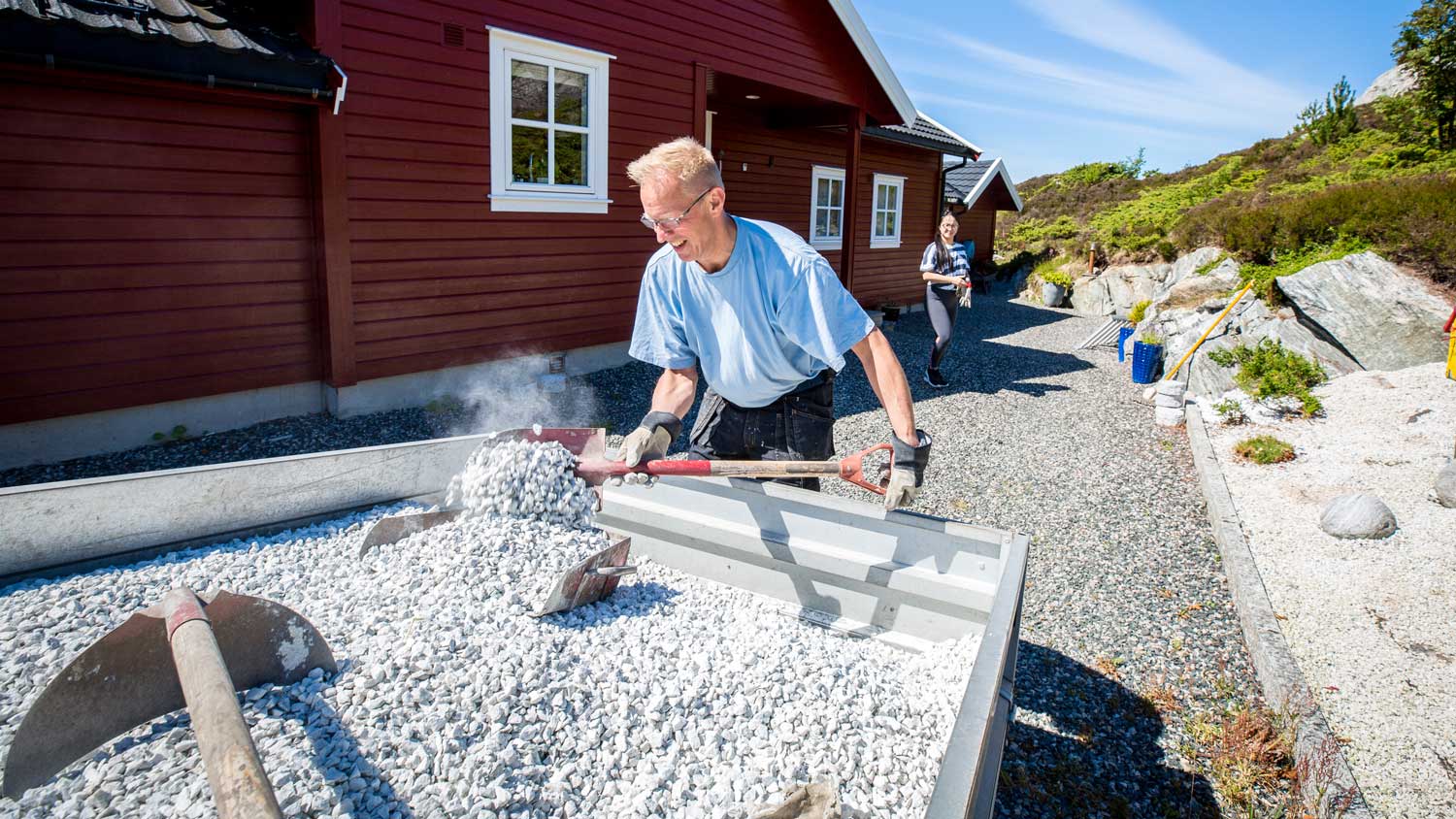
Discover the average gravel pad for shed cost, including installation, materials, and tips to save money. Get a detailed breakdown to plan your shed foundation project.
Stone and gravel service costs depend on your project and location. Check with a local pro for your specific job.
Gravel driveway costs range from $1 to $10 per square foot, depending on driveway size, gravel type, and site conditions.
Gravel driveways offer a budget-friendly, durable option, especially if you opt for materials like pea gravel or crush shell.
Professional installation ensures proper grading and drainage.
Upgrading your driveway can boost curb appeal and functionality, but maintenance is required to keep gravel driveways in top shape.
This article was created using automation technology and thoroughly fact-checked and edited by an Angi Editor in accordance with our AI policy.
Driveway gravel cost is a top concern for homeowners planning a new or replacement driveway. On average, gravel driveway costs $1,800, with most projects averaging $500 to $3,500. Expect to pay $1 to $10 per square foot, depending on gravel type, driveway size, and site prep needs.

New installations cost more than simply replenishing or replacing existing gravel, depending on the materials you choose. The cost for gravel ranges from $10 to $50 per ton, and driveways need 2.5 tons of gravel to cover 100 square feet at six inches deep. The actual type of gravel determines where your costs fall within the average range.
Pea gravel and crushed shell gravel are among the most affordable, while materials like blue stone, white gravel, or river rocks can cost between $50 and $160 per ton. Many types of gravel can be used to form most of a driveway, but some are meant only as edging materials or decorative features.
| Gravel Type | Cost per Ton |
|---|---|
| Item #4 | $10–$25 |
| Pea gravel | $20–$80 |
| Crushed shell | $20–$90 |
| Crushed granite | $25–$50 |
| Crushed limestone | $30–$40 |
| Caliche | $30–$100 |
| River rocks | $45–$100 |
| Blue stone | $50–$100 |
| White gravel | $50–$150 |
| Marble chips | $85–$400 |
The size of your driveway is one of the biggest factors in determining gravel driveway cost. Both the length and width, as well as the depth of gravel required, impact the amount of material and labor needed.
Single-car driveways are 10 feet wide, while double-car driveways are 20 feet wide. Circular and extra-long rural driveways require more gravel and labor. Gravel is sold by the ton or cubic yard, with a depth of 4 to 6 inches recommended for driveways. The cost per square foot for gravel ranges from $1 to $10, not including installation.
Here are example costs for gravel driveways:
| Driveway Size (Sq. Ft.) | Description | Cost Range (With Labor) |
|---|---|---|
| 200–300 | Single-car | $250–$900 |
| 400–600 | Double-car | $800–$2,200 |
| 1,000+ | Large or circular drive | $1,000–$5,000 |
| 2,000 | Long rural drive | $3,500–$6,000+ |
Hiring a professional for your gravel driveway can ensure a longer-lasting, better-performing surface. Several types of pros may be involved, each with their own labor rates and roles, for tasks like grading, spreading, and compacting the gravel. Delivery fees cover transporting gravel to your site, and equipment costs come into play if heavy machinery is needed for grading or compacting. If your project is complex, with curves or slopes, expect to pay more due to additional labor and equipment.
Excavation or grading specialists handle site prep, ensuring the base is level and properly sloped for drainage, charging $1,000 to $2,500 for driveways. Hauling and delivery services transport gravel to your site and charge $100 to $500 per load, depending on distance, though your gravel material costs may include delivery.
Labor rates can vary based on your region, project complexity, and pro experience. While hiring a pro increases upfront cost, it reduces the risk of drainage issues or uneven surfaces that can lead to costly repairs down the road.
Some projects need extra hands for specialized tasks. If you want a custom layout or decorative edging, a landscape designer can help for $50 to $150 per hour. For sites with water runoff concerns, a drainage specialist may be necessary, with fees from $10 to $100 per linear foot, depending on the solution required. If you need to remove an old driveway, junk removal or debris hauling services charge $250 to $680 per job.
Where you live has a significant impact on gravel driveway cost. Urban areas and regions with high costs of living tend to have higher labor and material prices. In rural areas, local gravel availability can lower costs, but if gravel must be shipped from far away, delivery fees increase.
Regional differences in labor rates and gravel type availability mean prices can vary widely. For example, the cost in the Midwest may be lower than on the coasts, due to both materials and labor.
Several extra factors can influence your gravel driveway cost beyond just materials and labor. Taxes and local surcharges may be added to your bill, especially in urban areas. Some contractors offer insurance or warranty options for installation for peace of mind, which may add to your total.
Upgrades like decorative or colored gravel, custom edging, or driveway lighting will increase costs. If your site is difficult to access, far from the street, or has obstacles, expect higher labor and equipment charges. Ongoing maintenance, such as periodic regrading, adding fresh gravel, or weed control, adds to lifetime costs—budget $100 to $400 per year for upkeep.
If your project involves removing an old driveway, demolition and prep costs will be part of your gravel driveway cost. Consider these average costs for demolition and prep work:
Removing asphalt: $4,750
Demolishing concrete: $1,300
Clearing brush or trees: $500–$2,000
Grading: $1,000–$3,000
Some municipalities require permits for new gravel driveways, especially if the project alters drainage or connects to a public road. Either the homeowner or the contractor can obtain the permit, but clarify this during planning. Permit costs vary by location, ranging from $50 to $300. In some areas, inspections or additional fees may be required, adding to the total project cost.
Many homeowners consider tackling gravel driveway installation themselves to save money. DIY projects avoid labor costs, with most expenses limited to materials, equipment rental, and delivery. Materials and equipment for a driveway may cost $800 to $2,500, while professional installation ranges from $1,500 to $6,000.
DIY installation requires tools like a skid steer, plate compactor, shovels, and rakes. You’ll need skills in grading, compacting, and basic drainage. Expect to spend several days on the project, especially if the area is large or uneven.
However, DIY can lead to problems like poor drainage or an uneven surface if not done correctly. It’s best to hire a gravel driveway pro if your site is sloped, large, or has challenging soil conditions. Professional installation provides expertise that can prevent issues and protect your investment.
When your gravel driveway shows signs of wear, you’ll need to decide between repair and full replacement. Repair means filling potholes, regrading, and adding new gravel. Full replacement, which involves removing the old gravel, prepping the base, and installing new material, costs $1,500 to $6,000.
A well-maintained gravel driveway can last 10 to 20 years. If there are deep ruts, drainage failures, or a failing sub-base, replacement is a better investment. The extent of damage, age of the driveway, and presence of underlying problems will guide your decision. Some contractors offer warranties for new installations, so ask about coverage during your planning.
Try these tips to keep your gravel driveway costs within your budget:
Choose locally sourced gravel to reduce delivery fees.
Schedule installation during off-peak seasons for better rates.
Opt for standard gravel types over decorative options.
Prepare the site yourself to save on labor.
Get multiple quotes from local pros.
Maintain your driveway regularly to avoid costly repairs.
Home is the most important place on earth, which is why Angi has helped more than 150 million homeowners transform their houses into homes they adore. To help homeowners with their next project, Angi provides readers with the most accurate cost data and upholds strict editorial standards. We extensively research project costs to develop the pricing data you see, so you can make the best decisions for you and your home. We rely on reputable sources, including the U.S. Bureau of Labor Statistics, academic journals, market studies, and interviews with industry experts—all to ensure our prices reflect real-world projects.
Want to help us improve our cost data? Send us a recent project quote to [email protected]. Quotes and personal information will not be shared publicly.
From average costs to expert advice, get all the answers you need to get your job done.

Discover the average gravel pad for shed cost, including installation, materials, and tips to save money. Get a detailed breakdown to plan your shed foundation project.

Before you contact a pro to lay gravel or loose fill for your driveway, walkway, or garden, review these gravel installation questions.

Choosing between crushed stone and gravel can impact your landscaping project. Keep reading to compare crushed stone vs. gravel and pick the best one.

Find out the best types of landscaping rocks for your home’s next outdoor project, from solving drainage problems to installing retaining walls and terraces.

The layer of dust on your driveway makes its way onto everything, including your car and windows. Learn how you can get rid of dust on your gravel driveway.

How much gravel do you need? We’ll walk through how to calculate the right amount of gravel with a simple formula.